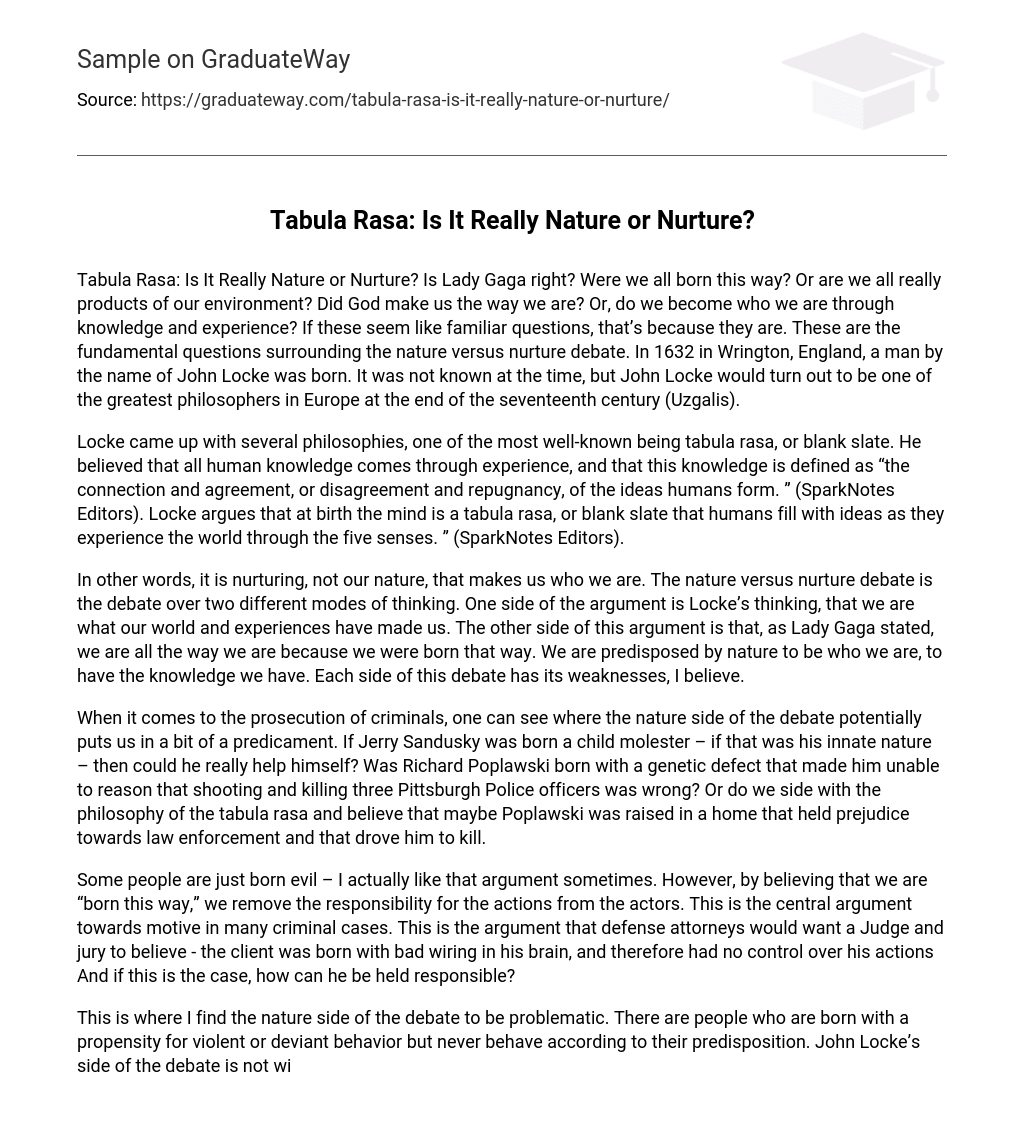Is Lady Gaga right? Were we all born this way? Or are we all really products of our environment? Did God make us the way we are? Or, do we become who we are through knowledge and experience? If these seem like familiar questions, that’s because they are. These are the fundamental questions surrounding the nature versus nurture debate. In 1632 in Wrington, England, a man by the name of John Locke was born. It was not known at the time, but John Locke would turn out to be one of the greatest philosophers in Europe at the end of the seventeenth century.
Locke came up with several philosophies, one of the most well-known being tabula rasa, or blank slate. He believed that all human knowledge comes through experience, and that this knowledge is defined as “the connection and agreement, or disagreement and repugnancy, of the ideas humans form. ”. Locke argues that at birth the mind is a tabula rasa, or blank slate that humans fill with ideas as they experience the world through the five senses. ”
In other words, it is nurturing, not our nature, that makes us who we are. The nature versus nurture debate is the debate over two different modes of thinking. One side of the argument is Locke’s thinking, that we are what our world and experiences have made us. The other side of this argument is that, as Lady Gaga stated, we are all the way we are because we were born that way. We are predisposed by nature to be who we are, to have the knowledge we have. Each side of this debate has its weaknesses, I believe.
When it comes to the prosecution of criminals, one can see where the nature side of the debate potentially puts us in a bit of a predicament. If Jerry Sandusky was born a child molester – if that was his innate nature – then could he really help himself? Was Richard Poplawski born with a genetic defect that made him unable to reason that shooting and killing three Pittsburgh Police officers was wrong? Or do we side with the philosophy of the tabula rasa and believe that maybe Poplawski was raised in a home that held prejudice towards law enforcement and that drove him to kill.
Some people are just born evil – I actually like that argument sometimes. However, by believing that we are “born this way,” we remove the responsibility for the actions from the actors. This is the central argument towards motive in many criminal cases. This is the argument that defense attorneys would want a Judge and jury to believe – the client was born with bad wiring in his brain, and therefore had no control over his actions And if this is the case, how can he be held responsible?
This is where I find the nature side of the debate to be problematic. There are people who are born with a propensity for violent or deviant behavior but never behave according to their predisposition. John Locke’s side of the debate is not without its issues either. Let’s take a look at mental health issues. The nature side of the debate would argue that we are naturally predisposed to certain mental health issues. The idea of tabula rasa, however, would indicate that these issues come from some experience we have in life.
While this may be true in some cases, it also allows for blame and/or stigma to be placed on individuals dealing with mental health issues. If blame is placed on the woman suffering from bipolar disorder, how can we really expect her to come forward and seek treatment? Personally, I think both arguments are correct. I believe that I was born with a specific set of genes and wires that initially determined who I was going to become as a person. My mother describes me as having been a quiet and pleasant child. However, I grew up in a home with a violent, alcoholic father.
So how was I able to maintain that quiet and pleasant disposition? If I were to only believe the nature side of this argument, then I would need to discuss this no further and I could conclude my paper here. I was born with that kind of disposition so that means that no matter what obstacles came my way, I was always going to maintain that disposition. If I would side with the believers of the nurture argument, then I should have become a product of my environment. I should be plagued with a violent temper and addictive tendencies.
I did not become that person, because I knew that was not the type of person I wanted to be. So I am a positive product of both my predisposition and my environment. I am a product of my nature and my nurture.





